Kiwi – “young” fruit in the domestic market. He is treasure trove of vitamins and trace elements. List of useful properties fetus affects. The pleasant taste of the fruit provides the opportunity wide use in cooking. The product is part of a variety of salads, desserts and main dishes, and drinks on his basis quench thirst in the summer heat. Let’s find out how many calories in kiwi, what is its chemical composition and what are the useful fruit properties.
Contents
How much does a kiwi weigh?
The quick answer: an average of 65 grams

Kiwi calories 1 pc – 32 kcal
|
Composition and nutritional value
In Kiwi there are vitamins known to science: A, B1, B2, B6, B9, C, E, PP. In addition, the composition of the fetus includes substances such as starch, a number of organic acids, valuable dietary fiber, fiber, macronutrients. Kiwi is rich in calcium, magnesium, sodium, phosphorus, sulfur, chlorine and trace elements such as copper, iron, iodine, molybdenum. A lot of potassium in it, necessary for normal functioning of the cardiovascular system.
Now we estimate the ratio of BZHU. As with most others fruit, composed of kiwi is not enough protein (0.8 g per 100 grams of product) and fat (0.4 grams). The last component, carbohydrates, more: 8.1 grams. Thanks to their high content of kiwi fast digested and absorbed by the body.
Kiwi calories per 100 grams < / h2>
Kiwi – a product for people who watch their weight. The fruit has one valuable property: the fruit burns calories well and eliminates fat deposits. Therefore, nutritionists recommend consuming at least 1 pc. per day people trying to lose weight. If you simultaneously provide high physical activity and join healthy nutrition, a beautiful and fit figure will not take long to wait. And all this – without harm to your health, as in the case of taking some diet pills.
| Name < / th> | Calories per 100 grams < / th> < / tr> < / thead> |
|---|---|
| Fresh < / td> | 47 kcal < / td> < / tr> |
| In dried (dried) < / td> | 340 kcal < / td> < / tr> |
| In canned < / td> | 145 kcal < / td> < / tr> |
| In candied fruits < / td> | 320 kcal < / td> < / tr> |
| In juice < / td> | 41 kcal < / td> < / tr> < / tbody> < / table>
Most often, kiwi is used fresh. It is a part of salads (before adding to them from an exotic fruit, squeezing the juice), in addition, the chefs decorate ice cream, milkshakes or desserts with fruit slices. It is used for cooking main dishes, sauces. Such products as dried kiwi fruit, mashed potatoes and candied fruits are rapidly gaining popularity. Let’s find out how many calories они содержат. Fresh < / h3>100 grams of kiwi, according to nutritionists, contains 47 kilocalories. One small peeled fruit has a weight of 65 grams. The energy value of an average fetus is 32 kcal. This allows you to attribute the fruit to the category of dietary products. Therefore, the use of even 5-6 kiwis per day will not lead to weight gain. Note the large capacity of ascorbic acid (vitamin C) in the fruit. Only 1 piece will satisfy the daily need for this substance. It is useful to eat kiwi in February, March and April, when the body is deficient in vitamins and microelements. In dried (dried) < / h3>Dried fruits do not lose the healthy qualities of fresh. On the contrary, in the process of drying the fruit gets rid of excess moisture, so that the concentration of valuable substances increases several times. The mineral composition of kiwi includes 18 elements. Most of it contains potassium – 300 mg per 100 grams of product. If you regularly use dried fruit, you will improve brain function, strengthen the immune system and normalize the functioning of the circulatory system. Calorie dried kiwi – 340 calories. Therefore, even a small portion of the product is able to quench the feeling of hunger. When buying dried kiwi, pay attention to the appearance of the fruit. Fruits should have a rich green tint. The taste is sweet and sour. High-quality and well-dried product should not contain chips or broken lobules. If the fruits are too soft, and dark spots are visible on their surface, it would be more rational to refuse such a dubious purchase. Remember the rule: the drier the dried kiwi – the better. Dried fruit does not lose its healing properties for 2 years, if you observe storage conditions. The temperature should be below + 25 ° С, and the place should be dry and dark. You can store kiwi in the refrigerator. If you want to dry the fruits yourself, cut the peeled fruits (pulp) into small slices and place them in an electric vegetable dryer. In 2.5-3.5 hours, the dried fruit will be ready. In canned (mashed) < / h3>Unlike many fruits, which lose most of the vitamins and microelements when they are “rolled up” for the winter, kiwi does not lose its beneficial properties even after preservation. Thanks present in the fruit acid, all vitamins are stored in a puree. Given that in the process of cooking the product sugar is added, the calorie content of canned kiwi increases to 145 kcal per 100 grams. This amount of mashed potatoes satisfies the daily need of the body in both vitamin C and organic acids. In kiwi candied < / h3>To make candied fruit, you need to soak it in water for several days. Then they are boiled 3-4 times in concentrated sugar syrup and dried in the oven. Candied fruits should not stick to each other or to your hands (this indicates violations in the process of technological production). If they are too hard or have a candied surface, it means that the storage conditions were violated. Kiwi fruit contains a lot of potassium, vitamin PP, phosphorus and beta-carotene. They have a sweet taste, well saturated (calorie content of 100 grams of product – 320 kcal). Candied fruits are a useful and nutritious alternative to sweets. < P> In the juice of kiwi < / h3>Kiwi juice is a fragrant and healthy drink produced by direct pressing. Regular consumption of a small amount of Fresch (squeezed from 2-3 fruits) will reduce the content of fatty acids in the circulatory system by 15-20% and reduce the likelihood of thrombus formation. For thousands of years Chinese doctors have used kiwi juice to improve digestive processes, reduce pain in rheumatism, and prevent the formation of kidney stones. Its consumption can even slow down the speed of graying hair! The calorie content of kiwi juice is inferior to the energy value of the fruit itself and is 41 kilocalories per 100 ml. | What is useful kiwi < / h2>A product with such an impressive content of vitamins and other elements favorably affects the body. Regular consumption will help you cure dozens of diseases and prevent the emergence of many health problems. We list the main useful properties of kiwi:
|






